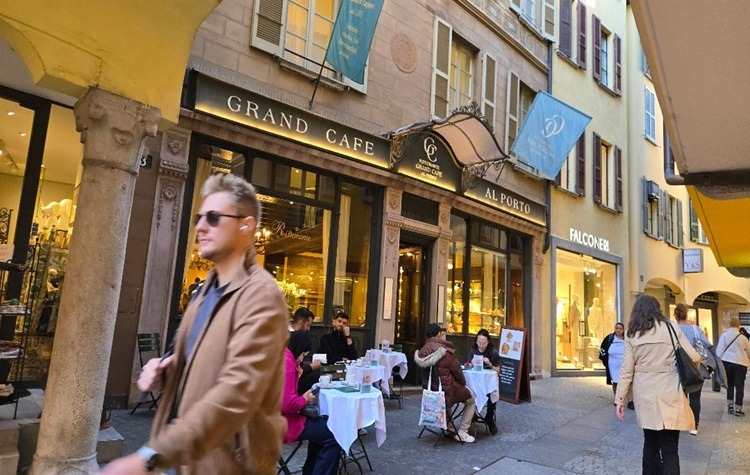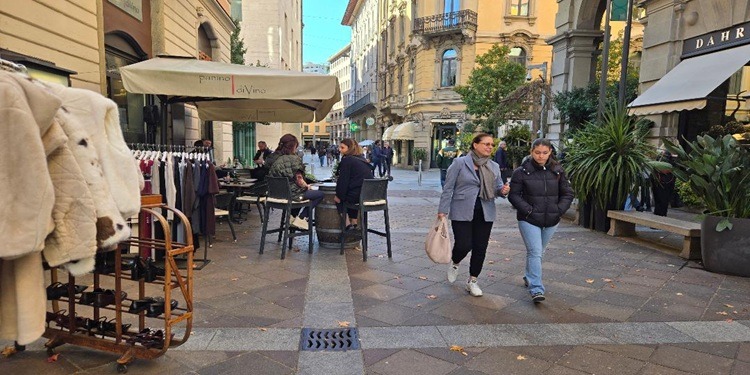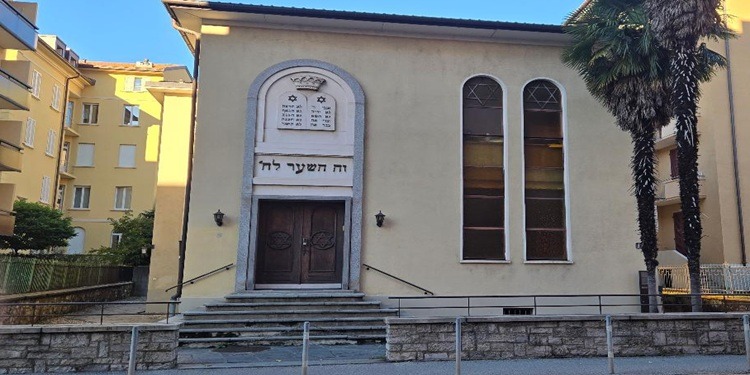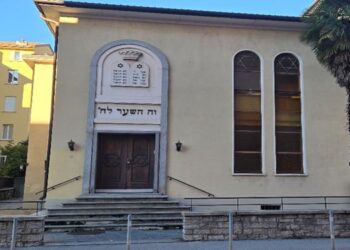On the surface, Lugano appears effortless—palm trees along the lakeshore, pastel villas rising into the hillside, and café tables catching the afternoon sun. But beneath this tranquility lies a city whose wartime footsteps still echo, softly but unmistakably. During World War II, Lugano became a threshold: a final, breathless crossing for Jewish refugees slipping out of Fascist Italy; a discreet stage where spies and diplomats met in rooms above cafés; and, later, a place where Jewish life began to take root again after devastation.
To walk through Lugano today is to move between serenity and memory, beauty and history—an invitation to look closer, and to listen.
A Refuge at the Edge of Fascist Italy
During World War II, Lugano sat close to the border of Fascist Italy. Switzerland maintained neutrality, but its border policies were complicated—sometimes merciful, sometimes restrictive. For Jews fleeing deportation, imprisonment, or forced labor under Mussolini and Nazi occupation, Ticino was both a threshold of hope and a test of endurance.
Local priests, families, and scout networks guided refugees silently through the mountains under the cover of night. For those who made it, Lugano offered the first taste of safety—a place where fear finally began to ease.
Secret Diplomacy Over Coffee
Few places capture this unlikely convergence of refuge and intrigue more vividly than the Grand Café Al Porto in Lugano’s old town. Elegant and unassuming, it appears now like any refined café—marble tables, brass fixtures, quiet conversation. But during the war, this café witnessed conversations that helped change the final chapter of the conflict in Northern Italy.

The Secret Meeting That Changed the Course of the War
Sabrina Papale-D’Agostino, a tour guide with guideSI, points out the historic Bianchi Restaurant, now known as the Florentine Last Supper Room at the Grand Café al Porto on Via Pessina. She explains, “It was a secret meeting to negotiate peace during the final months of the war. It was so clandestine that even the restaurant owner had no idea what kind of meeting was taking place.” Standing there today, visitors can sense the quiet tension that once filled the room.
On March 3, 1945, in this private upstairs dining room, six men gathered around a table in absolute secrecy. Two German SS officers, an American intelligence agent, an Italian industrialist serving as a discreet intermediary, and two Swiss intelligence officials met with no record, no photographs, and no official trace. Their purpose: to negotiate a local surrender of German forces in Northern Italy.
Hitler had ordered a scorched-earth retreat; SS General Karl Wolff sought to prevent it—and to negotiate terms for himself. Switzerland, represented in the room by intelligence officer Max Weibel, had its own urgent motives: preventing chaos, famine, and political collapse on its border.
The talks that started in Lugano set in motion Operation Sunrise, leading to the surrender signed in Caserta on April 29, 1945—weeks ahead of the war’s end in the rest of Europe.
The room still exists. Its coffered ceiling and frescoed walls quietly hold their secrets, a reminder that history often unfolds not on battlefields, but over hushed conversations at a café table.
Rebuilding Faith After the War
The end of the war did not erase trauma, but Jewish life in Lugano endured. Rabbi Moshe Mordechai Soloveitchik, a towering figure in Torah scholarship, served here before later leading yeshivot in Lucerne and Zürich. In 1959, the Jewish community built the Synagogue of Lugano on Via Maderno 11—its very presence a testament to continuity after catastrophe. It remains active today, welcoming residents and travelers alike.

Echoes in Modern Memory
Even in recent years, Lugano has been reminded that Jewish presence requires vigilance. In 2005, arson damaged the synagogue and a local Jewish-owned shop. Although authorities ruled out anti-Semitic intent, the incidents shook the community. Yet, as during the war, the response has been resilience, solidarity, and steadfast identity.
Why Lugano Matters for Today’s Jewish Traveler
Visiting Lugano is to walk streets where beauty and history coexist. Where refugees once crossed mountains in silence, visitors now stroll the lakeside promenade. Where spies once met in secret, travelers sip cappuccinos beneath frescoes. Where fear once dictated survival, Jewish prayer continues.
Lugano’s beauty is undeniable. Its depth is unforgettable.
For those who wish to explore this history more deeply during their visit, the city offers several places where the past remains quietly present:
If You Go
- Grand Café Al Porto – Visit the historic upstairs salon—today called the Florentine Last Supper Room—where the first secret negotiations of Operation Sunrise unfolded in 1945. Sit with a coffee and let the room speak for itself.
- Synagogue of Lugano – Via Maderno 11 – A modest and elegant synagogue built in 1959, representing the continuity of Jewish life in the Italian-speaking region of Switzerland. Visits are possible; check ahead for service times.
- Old Town & Lakeside Promenade – Walk the gentle curve of the waterfront and the narrow streets of the historic center—paths once walked by refugees, couriers, and silent observers of history.
- Day Trips to the Italian Border – From Lugano, short trips lead to border towns and mountain passes once used for clandestine crossings. Scenic today—life-saving once.

For Jewish travelers today, Lugano is not merely a destination—it is a place to pause and reflect on the fragile line between danger and refuge, loss and renewal. Its still waters and quiet streets hold the memory of those who crossed borders in fear and the strength of those who rebuilt their lives afterward. To be here is to honor resilience—the kind carried softly, without monuments or fanfare—and to witness how faith endures even under the most uncertain skies.
Lugano invites us not just to admire its beauty, but to remember its history, reflect on courage and resilience, and carry its story forward.
Meyer Harroch is the founder of the New York Jewish Travel Guide, documenting Jewish heritage, life, and culture around the world.
Special thanks to the Swiss Tourism Office and to Divine Bonga, of Switzerland Tourism North America, for their hospitality in showcasing Switzerland’s cultural and Jewish heritage.
Start Planning Today
https://www.myswitzerland.com/en-us/destinations/lugano/
Getting There: Book flights with SWISS – your journey starts here | SWISS









